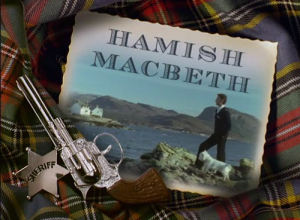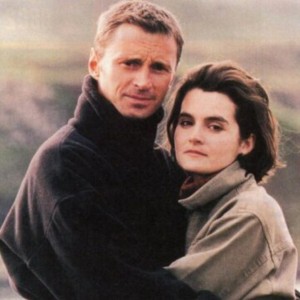Suspense, comedy, drama, and delightful locations mix in this Caledonian TV gem.
[In his weekly column, Alan Waldman reviews some of his favorite films and TV series that readers may have missed, including TV dramas, mysteries, and comedies from Canada, England, Ireland, Australia, and Scotland. Most are available on DVD and/or Netflix, and some episodes are on YouTube.]
Hamish Macbeth is a Scottish comedy-drama TV series that ran for three seasons (1995-1997) and 20 episodes, 19 of them on Netflix, including this one. The series was nominated for a BAFTA Best Drama Series award, and star Robert Carlyle was nominated for four Best Actor Awards, winning those from the UK Royal Television Society and the Scottish BAFTAs.
Carlyle plays laid-back, pot-smoking police constable Hamish Macbeth, and the series follows his adventures and those of his very eccentric neighbors and his West Highland terrier, Wee Jock. The series is based on characters from some of the 29 mystery novels (1985-2013) penned by Marion Chesney, writing as M.C. Beaton.
Waldman’s film and TV treasures you may have missed
Hamish occasionally bends the rules when it suits him or when it can help some of his fellow townsfolk. He strongly dislikes involvement from (big city) Inverness police, and sometimes his main job doesn’t seem to be the capture of local very petty criminals, but to keep them away from prison and penalties.
A major running theme of the series is the tension caused by Hamish’s attraction to both the journalist of the local newspaper, Isobel Sutherland (Shirley Henderson) and the aristocratic author Alexandra Maclean (Valerie Gogan). Other themes include the clairvoyance of Hamish’s friend and co-worker “TV John” McIver, the not-so-secret romance between the schoolteacher Esme Murray and the shopkeeper Rory Campbell, the volatile marriage of the publican Barney Meldrum and his wife Agnes and the schemes of the two Lachie MacCraes, father and son.
Hamish is a truly unambitious man, but his peaceful life is disrupted throughout the series as he is faced with murders and various misdemeanors in his orderly town. Macbeth solves these crimes in his easygoing Highland style.
The series had a slightly surreal quality to it, drawing on the superstitious natures of some of the characters and the rather eerie beauty of the remote and misty location. Sometimes circumstances warrant creative solutions, including poaching and bribery.
All 20 episodes were co-written by series creator M. C. Beaton. Eleven were co-written with Daniel Boyle, who also wrote episodes for classic series Inspector Morse, Rebus, and Murder Rooms: Mysteries of the Real Sherlock Holmes. Three episodes were written by Dominic Minghella, creator and primary writer of the worldwide hit Doc Martin.
Robert Carlyle won a BAFTA and four other honors for performing in The Full Monty, and he received five other awards and 13 nominations for works including Trainspotting, Cracker, Angela’s Ashes, and in the title role of Hitler: The Rise of Evil. Shirley Henderson has won nine awards and earned 10 nominations in five countries for works including Topsy-Turvy, Filth, American Cousins, and Wilbur Wants to Kill Himself.
In various episodes Hamish pursues questionable insurance claims, escaped criminal/dog killers, religious fanatics who dub him a devil, reports of aliens, family feuds, arson, and possible cheating at the annual local shinty match.
This is a charming, funny series; the local characters are very winning; and Henderson and Carlyle (two of my favorite thesps) are wonderful, as always.
[Oregon writer and Houston native Alan Waldman holds a B.A. in theater arts from Brandeis University and has worked as an editor at The Hollywood Reporter and Honolulu magazine. Read more of Alan Waldman’s articles on The Rag Blog.]




















Gold’s proficiency with the camera and the lining up of shots, as well as his obvious knowledge of Shakespeare (this is not the only BBC Shakespeare series he did), are paramount here. So are the set designs by Jerry Scott, and I’d call attention to four of these in particular.
http://postmoderndeconstructionmadhouse.blogspot.com/
Gold’s proficiency with the camera and the lining up of shots, as well as his obvious knowledge of Shakespeare (this is not the only BBC Shakespeare series he did), are paramount here.
http://postmoderndeconstructionmadhouse.blogspot.com/2014/06/macbeth-bbc-1987.html#.U6L_LpRdXxA
We seek originality in new presentations of Shakespeare (I suppose) in order to confirm our belief that, somehow, there is more flexibility built into his plays than into the work of most other dramatists. So when we see Lady Macbeth take a chocolate cake out of a refrigerator to serve it to Duncan, or see Macbeth blow a kiss at Ross after scolding him at dinner, we allow ourselves both a smile and a period of reflection.
http://postmoderndeconstructionmadhouse.blogspot.com/2014/08/excerpt-from-catch-nearest-way.html#.U-SccNKSxl9